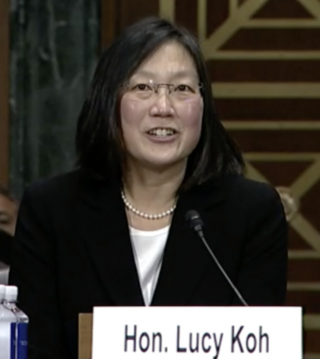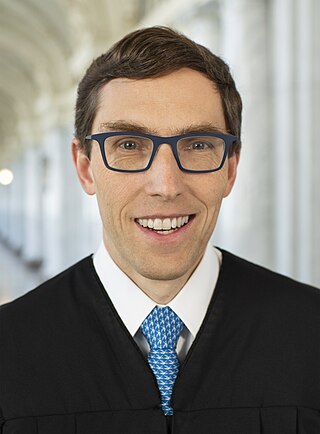
The Emergency Medical Treatment and Active Labor Act (EMTALA) is an act of the United States Congress, passed in 1986 as part of the Consolidated Omnibus Budget Reconciliation Act (COBRA). It requires hospital emergency departments that accept payments from Medicare to provide an appropriate medical screening examination (MSE) for anyone seeking treatment for a medical condition regardless of citizenship, legal status, or ability to pay. Participating hospitals may not transfer or discharge patients needing emergency treatment except with the informed consent or stabilization of the patient or when the patient's condition requires transfer to a hospital better equipped to administer the treatment.
Rust v. Sullivan, 500 U.S. 173 (1991), was a case in the United States Supreme Court that upheld Department of Health and Human Services regulations prohibiting employees in federally funded family-planning facilities from counseling a patient on abortion. The department had removed all family planning programs that involving abortions. Physicians and clinics challenged this decision within the Supreme Court, arguing that the First Amendment was violated due to the implementation of this new policy. The Supreme Court, by a 5–4 verdict, allowed the regulation to go into effect, holding that the regulation was a reasonable interpretation of the Public Health Service Act, and that the First Amendment is not violated when the government merely chooses to "fund one activity to the exclusion of another."

Consuelo María Callahan is a United States circuit judge of the United States Court of Appeals for the Ninth Circuit.
Conscience clauses are legal clauses attached to laws in some parts of the United States and other countries which permit pharmacists, physicians, and/or other providers of health care not to provide certain medical services for reasons of religion or conscience. It can also involve parents withholding consenting for particular treatments for their children.

Ronald Murray Gould is an American lawyer and jurist serving as a U.S. circuit judge of the U.S. Court of Appeals for the Ninth Circuit since 1999.
This is a timeline of reproductive rights legislation, a chronological list of laws and legal decisions affecting human reproductive rights. Reproductive rights are a sub-set of human rights pertaining to issues of reproduction and reproductive health. These rights may include some or all of the following: the right to legal or safe abortion, the right to birth control, the right to access quality reproductive healthcare, and the right to education and access in order to make reproductive choices free from coercion, discrimination, and violence. Reproductive rights may also include the right to receive education about contraception and sexually transmitted infections, and freedom from coerced sterilization, abortion, and contraception, and protection from practices such as female genital mutilation (FGM).
Earl Leroy Yeakel III, also known as Lee Yeakel, is a former United States district judge of the United States District Court for the Western District of Texas.

The legality of abortion in the United States and the various restrictions imposed on the procedure vary significantly depending on the laws of each state or other jurisdiction, although there is no uniform federal law. Some states prohibit abortion at all stages of pregnancy with few exceptions, others permit it up to a certain point in a woman's pregnancy, while others allow abortion throughout a woman's pregnancy. In states where abortion is legal, several classes of restrictions on the procedure may exist, such as parental consent or notification laws, requirements that patients be shown an ultrasound before obtaining an abortion, mandatory waiting periods, and counseling requirements.

Lucy Haeran Koh is an American lawyer serving as a United States circuit judge of the United States Court of Appeals for the Ninth Circuit. Koh previously served as a United States district judge of the United States District Court for the Northern District of California from 2010 to 2021. She also served as a California state court judge of the Santa Clara County Superior Court from 2008 to 2010. She is the first Korean American woman to serve on a federal appellate court in the United States.
Abortion is the termination of human pregnancy, often performed in the first 28 weeks of pregnancy. In 1973, the United States Supreme Court in Roe v. Wade recognized a constitutional right to obtain an abortion without excessive government restriction, and in 1992 the Court in Planned Parenthood v. Casey invalidated restrictions that create an undue burden on people seeking abortions. Since then, there has continued to be an abortion debate in the United States, and some states have passed laws in the form of regulation of abortions but which have the purpose or effect of restricting its provision. The proponents of such laws argue they do not create an undue burden. Some state laws that impact the availability of abortions have been upheld by courts. In 2022, Roe and Casey were overturned by the Supreme Court in Dobbs v. Jackson Women's Health Organization, meaning that states may now regulate abortion in ways that were not previously permitted.
Whole Woman's Health v. Hellerstedt, 579 U.S. 582 (2016), was a landmark decision of the US Supreme Court announced on June 27, 2016. The Court ruled 5–3 that Texas cannot place restrictions on the delivery of abortion services that create an undue burden for women seeking an abortion. On June 28, 2016, the Supreme Court refused to hear challenges from Wisconsin and Mississippi where federal appeals courts had enjoined the enforcement of similar laws.
Abortion in Texas is illegal in most cases. There are exceptions to save the mother's life, or prevent "substantial impairment of major bodily function", but the law on abortion in Texas is written in such an ambiguous way that it is unclear to physicians what health harms to the mother constitute an exception.
Jackson Women's Health Organization was an abortion clinic located in a bright pink building in Jackson, Mississippi's Fondren neighborhood. It was the only abortion clinic in Mississippi since the other one closed in 2006. The JWHO closed its doors on July 6, 2022, following the Supreme Court of the United States' decision in Dobbs v. Jackson Women's Health Organization, and the day before Mississippi's near-complete abortion ban went into effect.

Eric David Miller is an American attorney and jurist serving as a United States circuit judge of the United States Court of Appeals for the Ninth Circuit.
June Medical Services, LLC v. Russo, 591 U.S. ___ (2020), was a United States Supreme Court case in which the Court ruled that a Louisiana state law placing hospital-admission requirements on abortion clinics doctors was unconstitutional. The law mirrored a Texas state law that the Court found unconstitutional in 2016 in Whole Woman's Health v. Hellerstedt (WWH).
As of 2024, abortion is currently illegal in Indiana. It's only legal in cases involving fatal fetal abnormalities, to preserve the life and physical health of the mother, and in cases of rape or incest up to 10 weeks of pregnancy. Previously abortion in Indiana was legal up to 20 weeks; a near-total ban that was scheduled to take effect on August 1 was placed on hold due to further legal challenges, but is set to take place, after the Indiana Supreme Court denied an appeal by the ACLU, and once it certifies a previous ruling, that an abortion ban doesn't violate the state constitution. In the wake of the 2022 Dobbs Supreme Court ruling, abortion in Indiana remained legal despite Indiana lawmakers voting in favor of a near-total abortion ban on August 5, 2022. Governor Eric Holcomb signed this bill into law the same day. The new law became effective on September 15, 2022. But on September 22, 2022, Special Judge Kelsey B. Hanlon of the Monroe County Circuit Court granted a preliminary injunction against the enforcement of the ban. Her ruling allows the state's previous abortion law, which allows abortions up to 20 weeks after fertilization with exceptions for rape and incest, to remain in effect.

Lawrence James Christopher VanDyke is an American attorney and jurist serving as a United States circuit judge of the United States Court of Appeals for the Ninth Circuit. He is a former solicitor general of Nevada and Montana.
Dobbs v. Jackson Women's Health Organization, No. 19-1392, 597 U.S. 215 (2022), is a landmark decision of the U.S. Supreme Court in which the court held that the Constitution of the United States does not confer a right to abortion. The court's decision overruled both Roe v. Wade (1973) and Planned Parenthood v. Casey (1992), returning to individual states the power to regulate any aspect of abortion not protected by federal statutory law.
Whole Woman's Health v. Jackson, 595 U.S. ___ (2021), was a United States Supreme Court case brought by Texas abortion providers and abortion rights advocates that challenged the constitutionality of the Texas Heartbeat Act, a law that outlaws abortions after six weeks. The Texas Heartbeat Act prohibits state officials from enforcing the ban but authorizes private individuals to enforce the law by suing anyone who performs, aids, or abets an abortion after six weeks. The law was structured this way to evade pre-enforcement judicial review because lawsuits challenging the constitutionality of state statutes are typically brought against state officials who are charged with enforcing the law, as the state itself cannot be sued under the doctrine of sovereign immunity.
U.S. Food and Drug Administration v. Alliance for Hippocratic Medicine is a pending United States Supreme Court case to challenge the U.S. Food and Drug Administration (FDA)'s approval of mifepristone, a drug frequently used in medical abortion procedures. The plaintiffs, led by the Alliance for Hippocratic Medicine (AHM), argue that the FDA did not properly approve the use of the drug mifepristone for pregnancy termination under Federal Food, Drug, and Cosmetic Act regulations and ask for an injunction to withdraw the drug's approval, thus removing it from the market. AHM's suit followed the Supreme Court's ruling in Dobbs v. Jackson Women's Health Organization in 2022, which reversed Roe v. Wade and asserted there was no constitutional right to abortion at the federal level, leading to conservative states and groups to further restrict abortion access.







